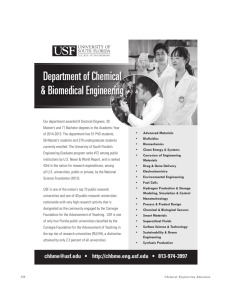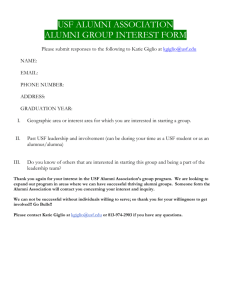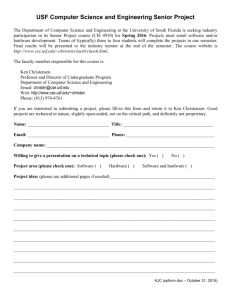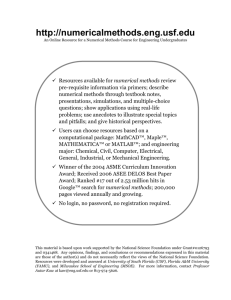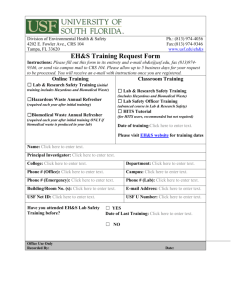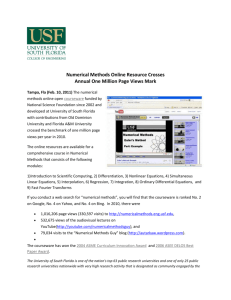College of Visual and Performing Arts
advertisement
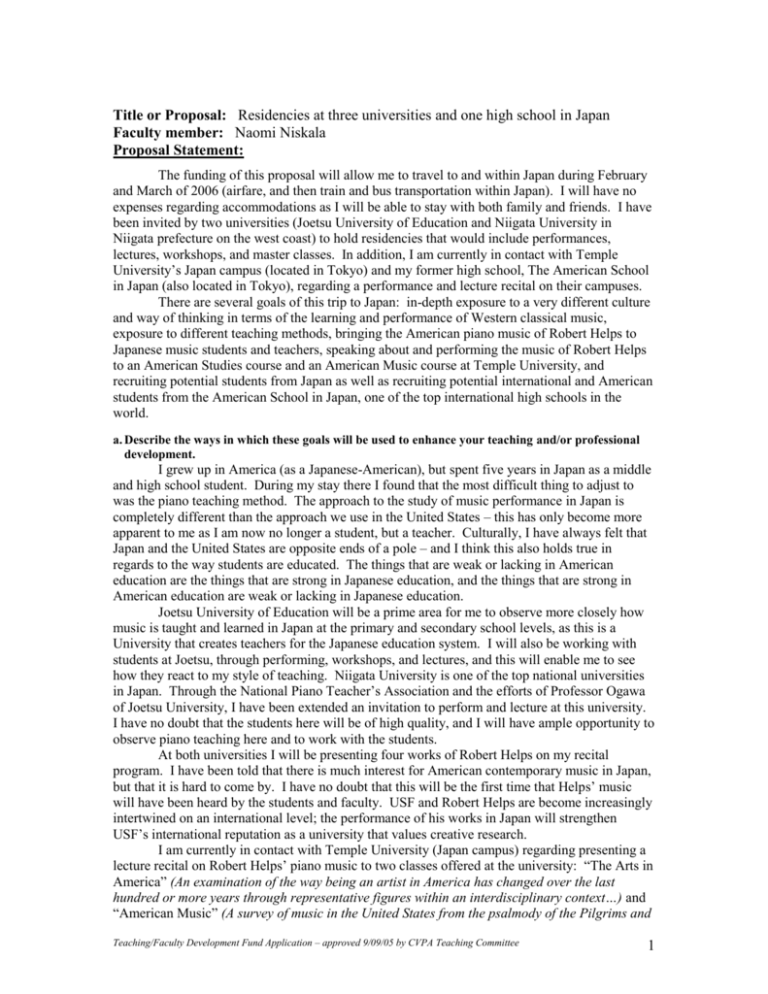
Title or Proposal: Residencies at three universities and one high school in Japan Faculty member: Naomi Niskala Proposal Statement: The funding of this proposal will allow me to travel to and within Japan during February and March of 2006 (airfare, and then train and bus transportation within Japan). I will have no expenses regarding accommodations as I will be able to stay with both family and friends. I have been invited by two universities (Joetsu University of Education and Niigata University in Niigata prefecture on the west coast) to hold residencies that would include performances, lectures, workshops, and master classes. In addition, I am currently in contact with Temple University’s Japan campus (located in Tokyo) and my former high school, The American School in Japan (also located in Tokyo), regarding a performance and lecture recital on their campuses. There are several goals of this trip to Japan: in-depth exposure to a very different culture and way of thinking in terms of the learning and performance of Western classical music, exposure to different teaching methods, bringing the American piano music of Robert Helps to Japanese music students and teachers, speaking about and performing the music of Robert Helps to an American Studies course and an American Music course at Temple University, and recruiting potential students from Japan as well as recruiting potential international and American students from the American School in Japan, one of the top international high schools in the world. a. Describe the ways in which these goals will be used to enhance your teaching and/or professional development. I grew up in America (as a Japanese-American), but spent five years in Japan as a middle and high school student. During my stay there I found that the most difficult thing to adjust to was the piano teaching method. The approach to the study of music performance in Japan is completely different than the approach we use in the United States – this has only become more apparent to me as I am now no longer a student, but a teacher. Culturally, I have always felt that Japan and the United States are opposite ends of a pole – and I think this also holds true in regards to the way students are educated. The things that are weak or lacking in American education are the things that are strong in Japanese education, and the things that are strong in American education are weak or lacking in Japanese education. Joetsu University of Education will be a prime area for me to observe more closely how music is taught and learned in Japan at the primary and secondary school levels, as this is a University that creates teachers for the Japanese education system. I will also be working with students at Joetsu, through performing, workshops, and lectures, and this will enable me to see how they react to my style of teaching. Niigata University is one of the top national universities in Japan. Through the National Piano Teacher’s Association and the efforts of Professor Ogawa of Joetsu University, I have been extended an invitation to perform and lecture at this university. I have no doubt that the students here will be of high quality, and I will have ample opportunity to observe piano teaching here and to work with the students. At both universities I will be presenting four works of Robert Helps on my recital program. I have been told that there is much interest for American contemporary music in Japan, but that it is hard to come by. I have no doubt that this will be the first time that Helps’ music will have been heard by the students and faculty. USF and Robert Helps are become increasingly intertwined on an international level; the performance of his works in Japan will strengthen USF’s international reputation as a university that values creative research. I am currently in contact with Temple University (Japan campus) regarding presenting a lecture recital on Robert Helps’ piano music to two classes offered at the university: “The Arts in America” (An examination of the way being an artist in America has changed over the last hundred or more years through representative figures within an interdisciplinary context…) and “American Music” (A survey of music in the United States from the psalmody of the Pilgrims and Teaching/Faculty Development Fund Application – approved 9/09/05 by CVPA Teaching Committee 1 Puritans to the electronic and experimental music of the present).” Performing the works of Robert Helps at Joetsu and Niigata Universities and presenting a lecture recital of Robert Helps’ works at Temple University are related to a project I started last spring semester. The culmination of that project (funded by my start-up funds, personal funds, and a USF Creative Researcher Grant) will be the recording of the entire solo piano works (approximately 150 minutes of music) of Robert Helps on a two CD set for Centaur Records. Being able to perform some of these works, as well as being able to discuss the works, their history, and their influences with students will enable me to further develop and strengthen my understanding and interpretation of these works. I am also in contact with my former high school, the American School in Japan, regarding a possible recital or lecture recital. This is an impressive high school, considered one of the top international schools in the world, with a wealth of interest placed in the arts. This past summer they started a multi-million dollar renovation of their performing arts complex, and while I am in Japan I would like to offer a recital as a token of my support for their new performing arts complex. b. Describe the areas in which your project supports the strategic goals and objectives of the unit, college and university. This proposed project will allow me to represent the college and the university and its mission to build an international presence. In my visit to Japan I will attend three universities and one international high school, and my visits will involve various platforms: performances, master classes, observations of teaching, lectures, and workshops. In addition, this is a multicultural project that will provide me with the opportunity to study teaching and learning techniques of a very different culture, and bring these observations back to my students and colleagues at USF. This project also affords me the opportunity to lecture on the piano works of Robert Helps, former USF School of Music professor from 1978 to 2001. Much of my lecture stems from materials in the USF Special Collections Library, a collection which I believe will become the center for any studying or learning of material by Robert Helps. USF has become increasingly tied, internationally, to Robert Helps (most noticeably with our new “Robert Helps Prize for Composition”), and presenting a lecture on Helps and his works will strengthen USF and the School of Music’s reputation. Visiting several universities and an international high school will also enable me to try and recruit students to USF for the future, helping USF to realize its goal in the diversification of its student body. Students at the American School in Japan come from all over the world (only about 30% of the students are Americans), it is regarded as one of the top international schools in the world, and 99% of the senior class go on to a four-year college. In addition, Japanese students are also more likely to be able to afford an education at USF without scholarship or graduate assistantships. It is my hope that my initial visit to Joetsu and Niigata Universities will result in a continued, long-lasting exchange with USF. During my visits at Joetsu and Niigata Universities I will be inquiring about an exchange between faculty members: I would like to be able to invite a faculty member from one of these universities to the USF School of Music, and have him or her present a recital and teach lessons and/or a master class at USF. I would in particular like to be able forge a relationship between USF and Niigata University; one where our faculty, and even students, could do exchanges. One area where I would like to focus on in the near future is our chamber music degree now offered at the School of Music. In Japan, the chamber music genre has surprisingly just begun to be important in the universities and music conservatories. I would like to be able to visit universities in Japan again with a duo or trio chamber group, where we could offer coachings and master classes in chamber music. Teaching/Faculty Development Fund Application – approved 9/09/05 by CVPA Teaching Committee 2
